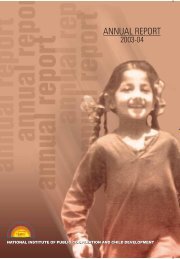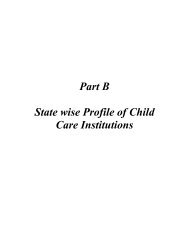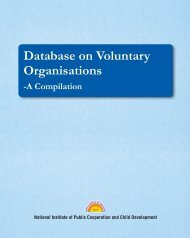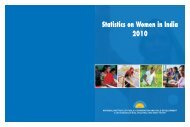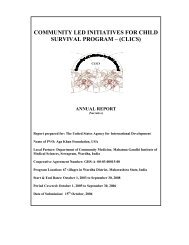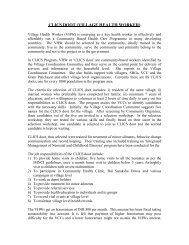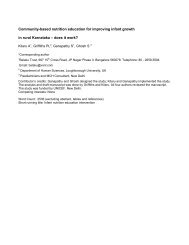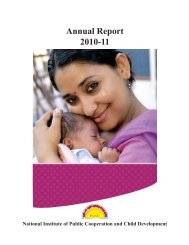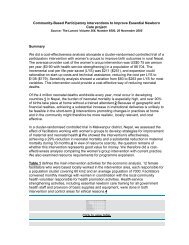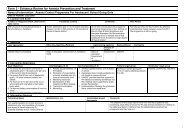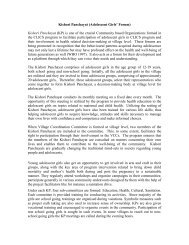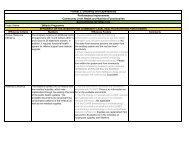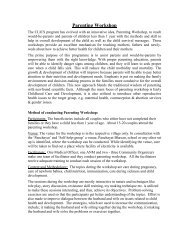Research Abstracts on Child Labour Women Labour - Nipccd
Research Abstracts on Child Labour Women Labour - Nipccd
Research Abstracts on Child Labour Women Labour - Nipccd
You also want an ePaper? Increase the reach of your titles
YUMPU automatically turns print PDFs into web optimized ePapers that Google loves.
Wages<br />
Singh, C.S.K. (2002).<br />
Cash and in-kind modes of wage payment in Maharashtra. NOIDA : V. V. Giri<br />
Nati<strong>on</strong>al <strong>Labour</strong> Institute. 26 p.<br />
Key Words : 1.LABOUR 2.WAGES 3.MINIMUM WAGES 4.CASH PAYMENT 5.NON CASH PAYMENT<br />
6.PAYMENT IN KIND 7.PIECE RATE WORK 8.AGRICULTURAL LABOUR 9.MAHARASHTRA<br />
Abstract : Wages, as defined under the Act, means all remunerati<strong>on</strong> capable of being<br />
expressed in terms of m<strong>on</strong>ey. The present study explores the prevalent modes of payment,<br />
the workers’ preference, and the preference determinants. The study covered five<br />
districts of Maharashtra namely, Sangli, Kolhapur, Ratnagiri, Pune and Nagpur. It was found<br />
that for the purpose of minimum wages, the State Government has classified workers into<br />
three categories: daily rated, mahinedar or m<strong>on</strong>thly rated, and saldar or salkari or working<br />
<strong>on</strong> yearly basis. It was also observed that the mode of wage payment, cash or in-kind is<br />
district neutral, taluk neutral and even village neutral. It is, instead, employment relati<strong>on</strong><br />
specific and crop specific. Cash payment as a principle mode of payment is supplemented by<br />
kind comp<strong>on</strong>ent (tea, wheat, chilli, <strong>on</strong>i<strong>on</strong>, coc<strong>on</strong>ut and clothes, etc.) as a subsidiary mode. It<br />
was found that in Kalamba village of Kolhapur district a large number of agricultural workers<br />
were migrants, both inter district and intra-district. They have been engaged as yearly<br />
workers for the last 10-12 years. The workers c<strong>on</strong>tracted debts from the employers and<br />
became permanent farm servants, getting a m<strong>on</strong>thly wage of Rs.1500/- plus breakfast <strong>on</strong><br />
paper. The actual cash wage was however Rs.20/- per day <strong>on</strong>ly. In Basarage village of<br />
Gandhingaj taluk, Pune, the situati<strong>on</strong> was identical. The Saldar workers were indebted to<br />
employers. Here the wage <strong>on</strong> paper was Rs.12,000/- per year. In additi<strong>on</strong> a worker gets the<br />
following articles in kind: wheat 50 kg, chilli 5 kg, <strong>on</strong>i<strong>on</strong> 10 kg, and clothes 1 pair. In Karnal<br />
village of Sangli district workers receive their share of wage payment in cash. There were<br />
instances of labour attachment system in cash crops as well. The farmers of Shankarpur<br />
village of Nagpur district employed saldar workers who were engaged in the cultivati<strong>on</strong> of<br />
guava, chiku (sapota) and papaya. M<strong>on</strong>thly wage was Rs.1200/- to Rs.1500/- inclusive of<br />
deducti<strong>on</strong> by the farm owner for adjusting the debt amount. In Narbe village of Ratnagiri<br />
district mango cultivati<strong>on</strong> provides employment for six to seven m<strong>on</strong>ths per year. The<br />
83<br />
<str<strong>on</strong>g>Research</str<strong>on</strong>g> <str<strong>on</strong>g>Abstracts</str<strong>on</strong>g> <strong>on</strong> <strong>Child</strong> <strong>Labour</strong>, <strong>Labour</strong> and <strong>Women</strong> <strong>Labour</strong> 1998 - 2009



